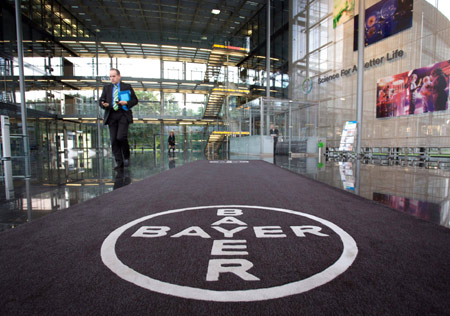Photos
Bayer ups Shanghai investment
Updated: 2010-12-10 09:54
By Liu Yiyu and Wang Ying (China Daily)
|
 |
|
The logo of Bayer AG at the entrance of the company's headquarters in Leverkusen, Germany. The nerve center of the company's Polycarbonates Business Unit will be relocated from Leverkusen to Shanghai. [Photo/Agencies] |
SHANGHAI / LEVERKUSEN, Germany - Bayer Group, the world's leading chemical and pharmaceutical company announced on Thursday it will invest 1 billion euros ($1.33 billion) in its Shanghai site to significantly expand its production capacity of high-grade materials in China by 2016.
The move signals that the Germany-based giant will focus more intensively on the Asia-Pacific region, where it expects consistent growth.
Bayer plans to double the Shanghai site's output annual capacity for the polyurethane raw material MDI to 1 million tons and for high-performance polycarbonate to 500,000 tons.
The company also intends to significantly strengthen its research and development (R&D) activities in Shanghai.
Moreover, the headquarters of the company's Polycarbonates Business Unit will be relocated from its main site in Leverkusen, Germany, to Shanghai to ensure even greater proximity to Asia's booming polycarbonates market.
"The expansion of our capacities in China is an important step in strengthening our presence in the emerging economies," said Bayer Group Management Board Chairman Marijn Dekkers.
"We want to increase Bayer's group sales in China to around 5 billion euros by 2015," he said.
The company's MaterialScience unit is expected to contribute at least half of this amount, Dekkers added.
In fiscal 2009, the Bayer Group in China recorded sales of 2.1 billion euros, of which MaterialScience accounted for 1.2 billion euros.
Bayer Group said its R&D spending in 2010 is likely to reach 3.1 billion euros, an increase of 13 percent year-on-year.
"The strong economic growth in China and in the whole region offers us outstanding opportunities, and we want to make the most of them," said Patrick Thomas, chief executive of Bayer MaterialScience.
"For us, it is strategically important to have the necessary capacities in the Asia-Pacific region to meet constantly rising demand."
Thomas stressed that this was one of the biggest single investments to date for Bayer MaterialScience.
In terms of sales, China is the second-most important country in the world for the Bayer subgroup. It is already investing 2.1 billion euros in Shanghai as part of a long-term project lasting until 2012.
Along with Thursday's announcement, this means a total investment of more than 3 billion euros.
For these new projects, a Memorandum of Understanding has now been signed with the relevant authorities.
In addition, Bayer wants to increase its raw materials capacities in Shanghai for the production of polyurethane rigid foam, which is used, for example, to save energy throughout the cool chain as an insulant.
To this end, it plans to build a new MDI plant with an annual production capacity of 500,000 tons.
|
||||
With the expansion of its R&D center for polymers in Shanghai, Bayer MaterialScience intends to strengthen its capability as a provider of innovative solutions.
It plans to concentrate on areas in which China plays a leading global role, such as wind turbines and solar energy plants.
Furthermore, Shanghai will become the new headquarters of the global polycarbonate activities of Bayer MaterialScience. The management team headed by Gnter Hilken will move there from Leverkusen.
The relocation is scheduled to begin next year. By moving closer to its customers, Bayer MaterialScience is taking account of the importance of the region for the global polycarbonates market. The company expects this step to speed up decision-making and to achieve more efficiency generally in day-to-day operations.
After realizing sales of 7.5 billion euros in 2009, Bayer MaterialScience is among the world's largest polymer companies. Business activities are focused on the manufacture of high-tech polymer materials and the development of innovative solutions for products used in many areas of daily life.
The main areas served are the automotive, electrical and electronics, construction and sports and leisure industries. At the end of 2009, Bayer MaterialScience had 30 production sites and employed approximately 14,300 people around the globe.
E-paper

Ear We Go
China and the world set to embrace the merciful, peaceful year of rabbit
Preview of the coming issue
Carrefour finds the going tough in China
Maid to Order
Specials

Mysteries written in blood
Historical records and Caucasian features of locals suggest link with Roman Empire.

Winning Charm
Coastal Yantai banks on little things that matter to grow

New rules to hit property market
The State Council launched a new round of measures to rein in property prices.




